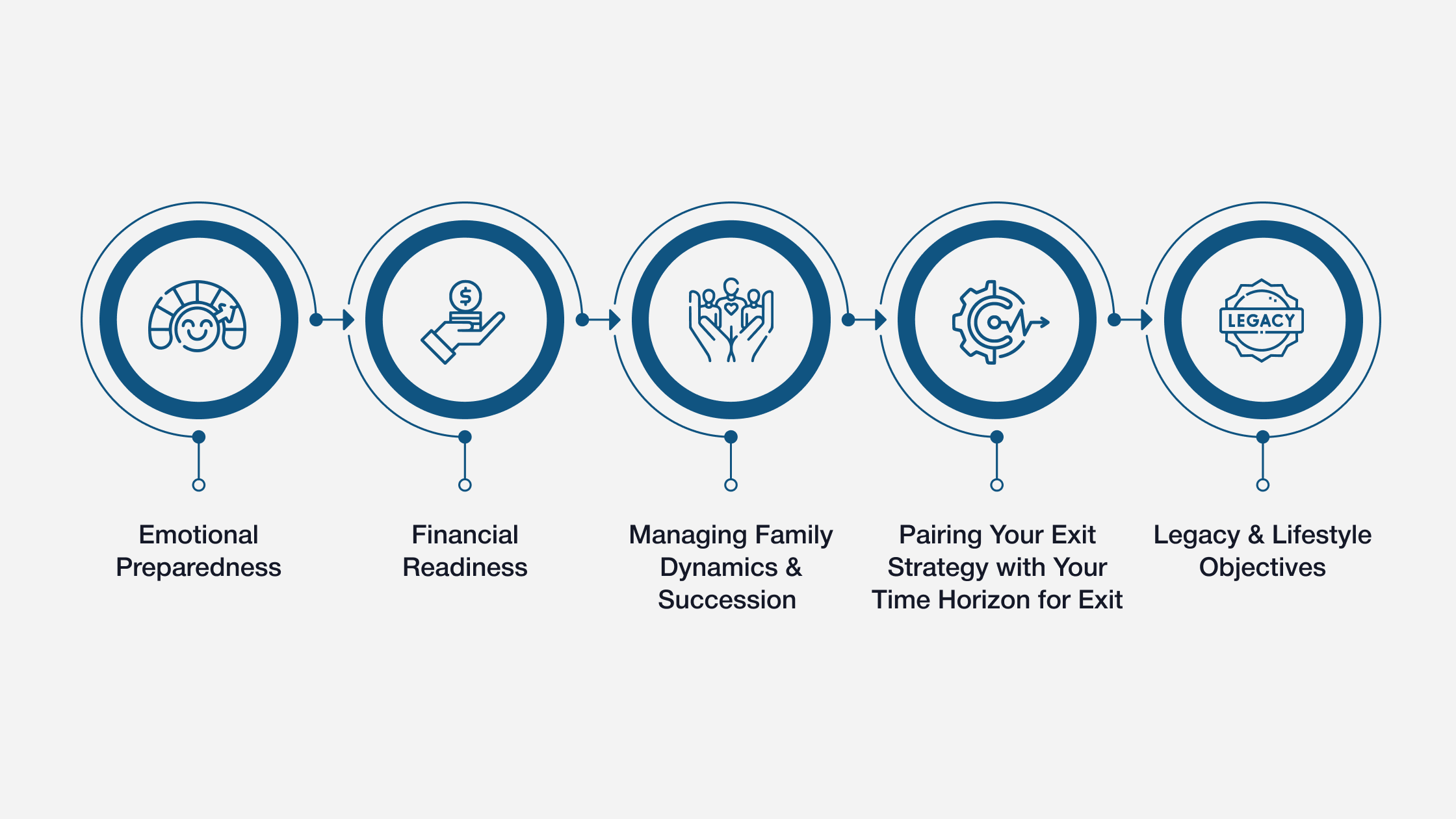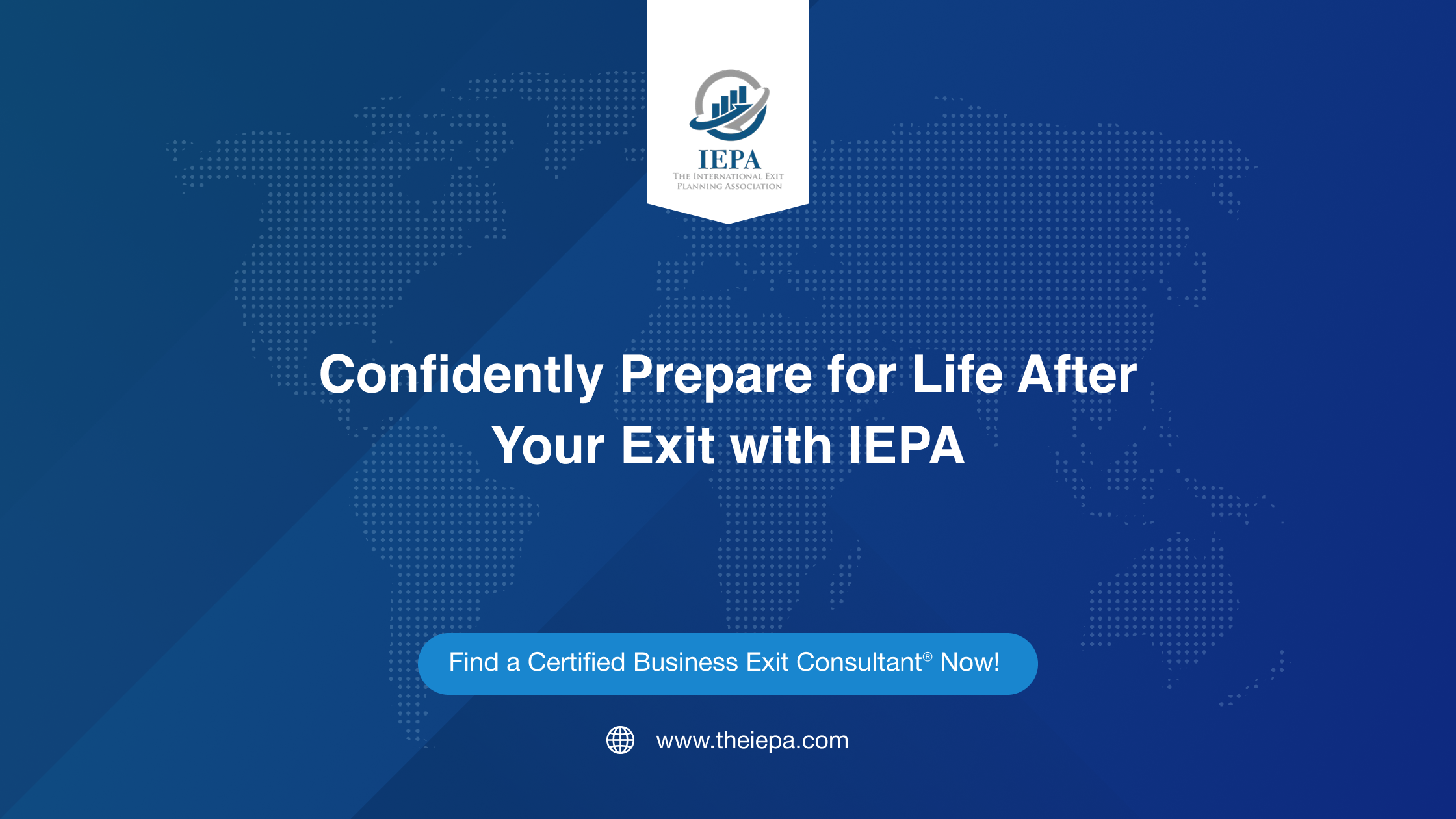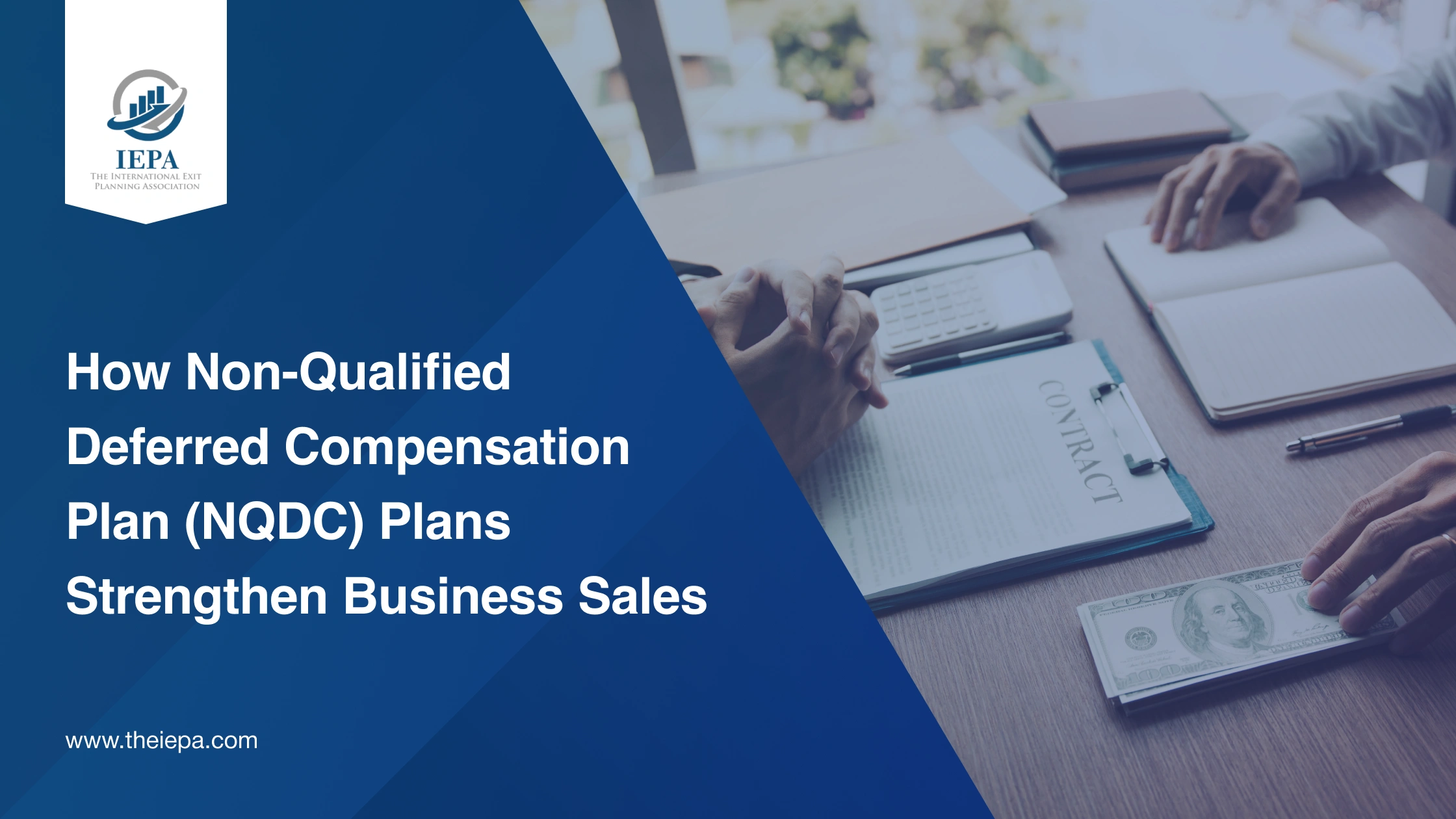Arguably, the most crucial phase in the life of a business is the one in which the business owner is often the least prepared for: their succession and exit from the business.
Whether succeeded by a family member, management team, the company’s employees (via an ESOP), or an outright exit to a strategic buyer, a business owner must consider the business and financial aspects of his or her transition, and their own “personal readiness” for what happens after they have exited their business.
In this blog, we’ll discuss the five broad “personal readiness” succession and exit planning considerations and eight essential personal readiness questions to help a business owner create a comprehensive “personal readiness plan” that will further ensure the business owner is mentally prepared for life after their exit.
The Importance of Planning
Many owners are approaching an exit without the preparation required for a successful transition, as the supporting statistics make clear. In addition to a formal business succession and exit plan, a well-structured “personal readiness” plan is equally essential.
- More than 70% of U.S. business owners plan to exit in the next 10–15 years, yet fewer than 25% have a written exit plan, and only 17% have documented their exit plan.
- Generational transition success rates remain low: 30% transfer to the second generation, 12% to the third, and just 3% to the fourth.
- Emotional readiness is a significant gap: 58% of owners felt unprepared for the emotional side of their exit.
- Lack of personal planning leads to regret: 75% of owners wished they had planned their next chapter within a year of exiting.
Five Major Personal Readiness Factors in Succession & Exit Planning
Considering these factors in advance sets the stage for a smoother transition and long-term post-exit fulfillment.
1. Emotional Preparedness
Many business owners underestimate the emotional impact of stepping away, but, as highlighted in the Harvard Business Review in 2019, for most business owners, a big part of their identity is tied to their business, so when they exit their business, these owners can experience an identity crisis.
Losing their identity after they exit the business can result in the business owner questioning their core beliefs, leading to feelings of confusion, a lack of purpose, and a sense of disconnection from others. In severe cases, this loss of identity can also lead to anxiety, depression, and feelings of despair.
Important questions a business owner should ask when preparing mentally for their exit include:
- Who am I without my business?
- How will I spend my time after I exit my business?
- Am I emotionally ready to let go of control of my business?
The first mental readiness exercise every exiting owner should complete is to:
(a) Create a vision of their post-exit,
(b) Perform a self-assessment and gap analysis to help them create a plan to get where they want to be, and
(c) Prepare a list of psychological and emotional paradigm changes that will be needed to transition out of the business mentally.
2. Financial Readiness
While many owners believe the sale of their business will be sufficient to fund their retirement, that assumption can be risky without sound financial planning. According to a popular study, only 20% to 30% of business owners have done sufficient financial planning to support their post-exit lifestyle.
As it relates to financial readiness, exiting business owners should ask themselves:
- How much do I need to maintain my lifestyle after exiting my business?
- Will the sale of my business meet that need?
- Do I have a diversified portfolio to fund my post-exit lifestyle?
Because 80% of an owner’s net worth is usually tied to their business, there is substantial financial risk if the business owner’s financial plan is inadequate to fund their lifestyle in retirement; however, if the owner does not have the money to retire comfortably, a good consultant could help him or her improve the value of their business to close that gap.
3. Managing Family Dynamics & Succession
When ownership in a family business is transferring to one or more family members, successor readiness and alignment can be complex. Owners often delay decisions to avoid conflict, but unresolved family dynamics can derail succession plans entirely.
Major questions to ask in a family succession include:
- Is/Are my chosen successor(s) capable and willing to run the business?
- Are family expectations aligned?
- Have I communicated the plan transparently?
A 2022 Deloitte report found that only 34% of family businesses have a formal succession plan, and that 60% of succession failures stem from a lack of communication and trust. However, hiring a certified succession or exit planning consultant can help ensure a smooth owner succession.
4. Pairing Your Exit Strategy with Your Time Horizon for Exit
Personal readiness also involves having realistic timelines and understanding your best exit options. Regardless of your exit vehicle, your exit plan should:
- Be established at least 3–5 years before your anticipated exit.
- Give successors time to shadow leaders and take the lead on key company initiatives.
- Engage advisors (legal, tax, financial, etc.) coordinated by an IEPA Certified Business Exit Consultant (CBEC®).
Per a 2023 exit planning association study, rushed exits often result in lower sale prices and missed opportunities. Still, business owners who plan early are twice as likely to achieve their personal and financial goals post-exit.
5. Legacy & Lifestyle Objectives
Personal fulfillment doesn’t end with an owner’s exit. Understanding the owner’s goals post-exit, whether philanthropic, to travel, or start a new venture, can give a business owner’s transition purpose and direction.
When it comes to legacy and lifestyle goals, a business owner should think about:
- How do I want to be remembered?
- What does a successful transition look like after my exit?
- What causes or interests do I want to pursue after I exit my business?
Eight Essential Post-Exit Personal Readiness Questions
Personal readiness ensures an exiting owner’s peace of mind. Taking time to reflect on one’s identity, personal goals, and legacy can help a business owner mentally prepare for their next chapter.
My eight essential “personal readiness” planning questions to answer around the business owner’s exit include:
- What passions do I want to pursue after I exit my business?
- What do I need to do to maintain my physical, mental & spiritual health?
- What are my relationship goals with my significant other, family, friends, and colleagues?
- What are my retirement vacation and recreation goals?
- How do I want to give back or serve others through mentoring or community involvement?
- What are my post-exit personal growth and development objectives?
- How do I ensure my financial security?
- How much time do I want to spend in each one of these areas?
If you can answer these eight questions and put together a comprehensive “personal readiness plan” using the guidance above, you should be mentally prepared for your next chapter.
Confidently Prepare for Life After Your Exit with IEPA
The central question for an exiting business owner isn’t just “is my business ready for my exit?” but also “am I mentally prepared for life after my business exit?”
The International Exit Planning Association (IEPA) has several insightful exit planning assessments to:
(a) help a business owner mentally prepare for their exit,
(b) gauge their business’s readiness for the owner’s exit, and
(c) evaluate their business’s potential for growth (which measures how much money the business owner could be leaving on the table)
Reach out to a Certified Business Exit Consultant (CBEC®) in your area today to guide you through these crucial assessments and help you create a comprehensive business exit plan that will ensure that you are mentally prepared for your next chapter.
Find a Certified Business Exit Consultant® Now!
About the Author:
James J. Talerico, Jr., CMC® CBEC® is an award-winning author, blogger, speaker, and nationally recognized small to mid-sized (SMB) business expert, with outstanding business consulting, succession planning, value acceleration, and exit planning credentials. He is the owner of Greater Prairie Business Consulting, Inc. (www.greaterprairiebusinessconsulting.com) located in Irving, Texas. He has helped thousands of business owners throughout the US and in Canada maximize their business performance and exits for more than 30 years. Jim currently sits on the IEPA’s Education Committee.






